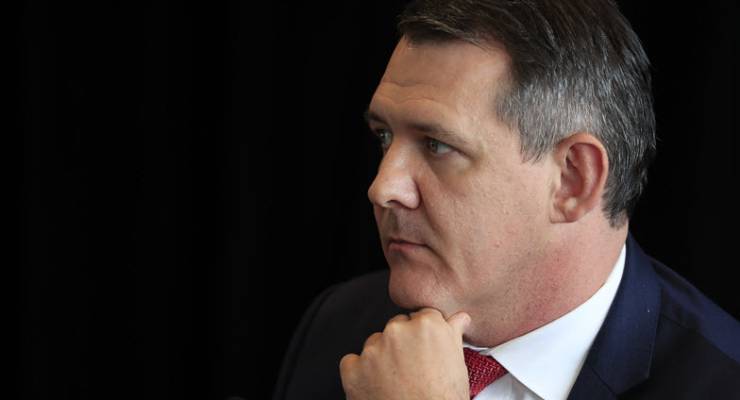
Northern Territory Chief Minister Michael Gunner
In late 2015 the then Country Liberal Party government in the Northern Territory awarded sandalwood plantation operator Tropical Forestry Services (TFS — now Quintis Limited) “major project status”, which was supposed to triple TFS sandalwood production across the Territory. At the time, major project status signified that a project was of “major economic importance” and would receive “whole-of-government coordination” to grease the wheels of regulatory approval and assist with the management of economic, environmental and social impacts.
But, as a document leaked to the ABC’s James Oaten in February 2016 revealed, the NT government’s Department of Land and Resources Management warned that there was insufficient water in the NT to supply TFS’s projected needs, noting that “similar forestry schemes have had a record of failure”. TFS was then the largest single water user in the NT and over the past 18 months it has increased its water allocations, with government records indicating that Quintis controls, through both direct and indirect water licence allocations, upwards of 35,000 million litres (ML) of NT groundwater.
James Oaten’s revelations were soon followed by a statement by then shadow minister for government accountability — and now Deputy Chief Minister — Nicole Manison, calling, among other things, for the CLP government to release all details about the grant of major project status to TFS.
The activities of TFS/Quintis in the NT have long been the subject of widespread scrutiny and concern, not least because of the perceived close links between the company and the former CLP government. Following the ALP’s victory in the NT general election in August 2016. Early this year the Gunner government commissioned a review of water allocations by the CLP. The Northern Myth understands that the final report has been provided to government. Enquiries by The Northern Myth as to when the NT government would release either the report or a response have been met with a curious silence, with word on the street that the report has sparked serious divisions within Chief Minister Michael Gunner’s cabinet.
Similarly curious is the fact that the Gunner government has seen fit to continue Quintis’ major project status. As will become clear, if there were grounds for concern about the company’s activities in the NT 18 months ago, recent events warrant even closer attention.
Soren Aandahl, co-founder of the Austin, Texas-based short-selling hedge fund Glaucus Research Group, travelled to Australia earlier this year to ground-truth the research his firm had invested more than 700 hours into. He’d come half-way across the world to look for Australian firms that he gleefully described as “follies, frauds and fads”. As the Financial Review reported at the time, Aandahl wasn’t finding “droves of material misrepresentation or really rotten companies,” more a “couple of rotten apples”.
Six weeks later the identity of the first of Aandahl’s “rotten apples” became clear. On March 22 TFS was busy reinventing itself, morphing from sandalwood grower and managed investment scheme promoter to luxury goods and wellness-ness operator Quintis Limited. TFS founder, major shareholder and CEO Frank Wilson told Sue Neales at The Australian the TFS tag didn’t match the Quintis re-branding as a provider of “sustainable luxury” and “no longer stands for what we have become”.
But on the very day that Quintis was launched — with awfully exquisite timing that Aandahl insists was purely coincidental — it became obvious that TFS/Quintis was the first of Aandahl’s “rotten apples”. The Glaucus report is worth a read for the casual observer as much for the refreshing — if not uncomfortable — light that it sheds on the soft underbelly of Australian corporate practice and regulation. As John Hempton, founder of Australian long-short hedge fund Bronte Capital Management, told The Fin’s Adam Haigh and David Stringer in February, the arrival of deeply cynical offshore short-sellers was unsurprising, given that the “perception from foreigners is that the market is a little dopey and that the corporate regulator is a little soft … You do find frauds here. They make obvious targets.”
Crikey alumna Myriam Robin provides a useful explainer on the black arts of short-selling at The Sydney Morning Herald here.
Glaucus described Quintis as having a “Ponzi-like structure,” adding that its major Chinese customer was anything no more than: “a tiny commodities importer with minimal operations and a small balance sheet”.
*Read the rest at Crikey blog The Northern Myth








Crikey is committed to hosting lively discussions. Help us keep the conversation useful, interesting and welcoming. We aim to publish comments quickly in the interest of promoting robust conversation, but we’re a small team and we deploy filters to protect against legal risk. Occasionally your comment may be held up while we review, but we’re working as fast as we can to keep the conversation rolling.
The Crikey comment section is members-only content. Please subscribe to leave a comment.
The Crikey comment section is members-only content. Please login to leave a comment.